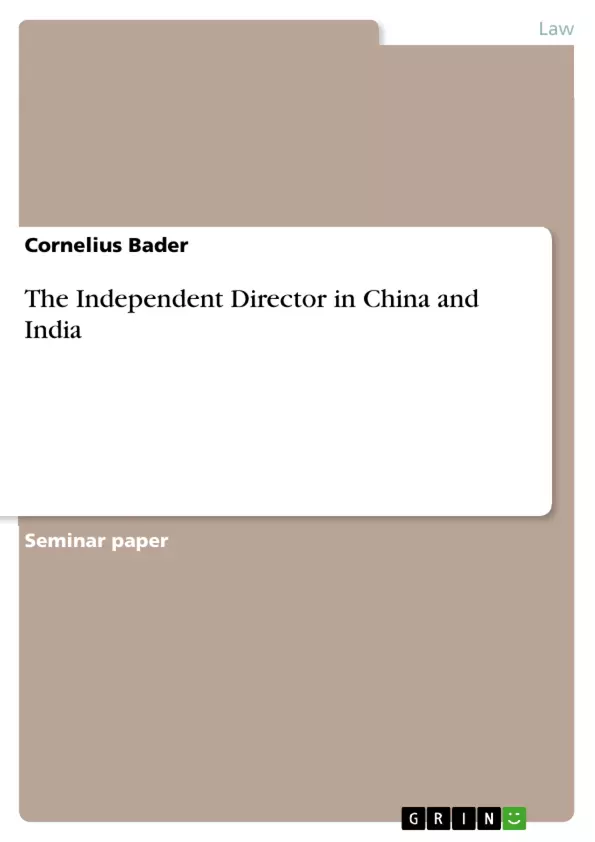The “independent director” has become a centerpiece of modern corporate governance. However, the concept of “independence”, and the ability of independent directors to fulfill their roles, remains deeply problematical.
In the course of the discussion on the proper role of independent directors that unfolded in Europe and the United States during the 1980s and 1990s and peaked in the wake of the Enron scandal, rules on director independence have found their way to the corporate governance regimes of developing countries that turned their head to western economies. Particularly in China and India, independent directors have taken their place on company boards, earning mixed responses from the academic and business community.
What is the current state of Indian and Chinese rules on director independence? What tensions do they address and create? And what can be done to optimize the achievement of their objectives? The goal of this article is to examine the status quo of director independence in the two countries, to put the regulations into their historic and political context, to summarize practical experiences with the new institution, and to point to possible future developments.
Inhaltsverzeichnis (Table of Contents)
- I. Introduction
- II. China
- 1. The Chinese concept of director independence
- a. Guidelines for Introducing Independent Directors to the Board of Directors of Listed Companies (2001)
- b. Other Rules and Initiatives
- 2. Historical background and objectives of the regulation
- 3. Experience, criticism and suggestions for improvement
- 1. The Chinese concept of director independence
- III. India
- 1. The Indian concept of director independence
- a. Desirable Corporate Governance: A Code (1998)
- b. Listing agreement “Clause 49”
- c. The Companies Act of 1956 and the Companies Bill 2009
- d. Corporate Governance Voluntary Guidelines 2009
- 2. Historical background and objectives of the regulation
- a. Internationalization of Indian corporations and the industry's leading role in promoting good corporate governance
- b. The rivalry between the regulators
- c. SEBI's initiative towards Clause 49
- d. The MCA's initiative towards a revision of the Companies Act 1956
- 3. Experience, criticism and suggestions for improvement
- 1. The Indian concept of director independence
- IV. Conclusion
Zielsetzung und Themenschwerpunkte (Objectives and Key Themes)
This article examines the status quo of director independence in China and India, placing the regulations within their historical and political context. It summarizes practical experiences with this new institution and points to possible future developments. The primary goal is to assess the current state of rules governing director independence in these two countries, analyzing the tensions they address and create.
- The evolving concept of director independence in China and India
- The historical and political context of regulations on director independence
- The practical experiences and challenges associated with implementing director independence
- Potential future developments in the regulation of director independence
Zusammenfassung der Kapitel (Chapter Summaries)
- Introduction: The article introduces the concept of the "independent director" as a cornerstone of modern corporate governance and explores the challenges of ensuring their independence. It outlines the various roles and objectives of independent directors, including protecting shareholder interests, safeguarding minority shareholders, and providing outside advice to corporate management. The article also highlights the global influence of the independent director model, particularly in developing countries like China and India.
- China: This chapter delves into the Chinese concept of director independence, focusing on the "Guidelines for Introducing Independent Directors to the Board of Directors of Listed Companies (2001)." It examines the criteria for independent director qualification, including minimum board representation, specific independence requirements, and limitations on related party transactions. The chapter also discusses the importance of these guidelines and other regulations in promoting corporate governance in China.
- India: This chapter explores the Indian concept of director independence, discussing various regulations, including the "Desirable Corporate Governance: A Code (1998)," the "Listing agreement “Clause 49,”" and the "Companies Act of 1956 and the Companies Bill 2009." It analyzes the historical background and objectives of these regulations, focusing on the factors that drove their implementation, such as internationalization of Indian corporations and the promotion of good corporate governance.
Schlüsselwörter (Keywords)
This article focuses on the concept of director independence in China and India, examining the regulations, their historical context, practical experiences, and potential future developments. Key themes include corporate governance, shareholder protection, minority shareholder rights, independent director roles, and the impact of internationalization on corporate governance practices.
Frequently Asked Questions
What is the role of an independent director?
Independent directors are meant to protect shareholder interests, safeguard minority rights, and provide unbiased outside advice to corporate management, acting as a check on internal executive power.
When did China introduce guidelines for independent directors?
China introduced the "Guidelines for Introducing Independent Directors to the Board of Directors of Listed Companies" in 2001.
What is "Clause 49" in the Indian context?
Clause 49 is a significant part of the Indian listing agreement established by SEBI (Securities and Exchange Board of India) to improve corporate governance standards for listed companies.
Why did developing countries like China and India adopt Western corporate governance models?
The adoption was driven by the internationalization of their corporations and the need to attract global investors following scandals like Enron, which highlighted the importance of independent oversight.
What are the main challenges for independent directors in these countries?
Challenges include defining true "independence" in markets with concentrated ownership, managing political influences, and ensuring that directors have the actual power to influence board decisions.
- Quote paper
- Cornelius Bader (Author), 2010, The Independent Director in China and India, Munich, GRIN Verlag, https://www.grin.com/document/174900



